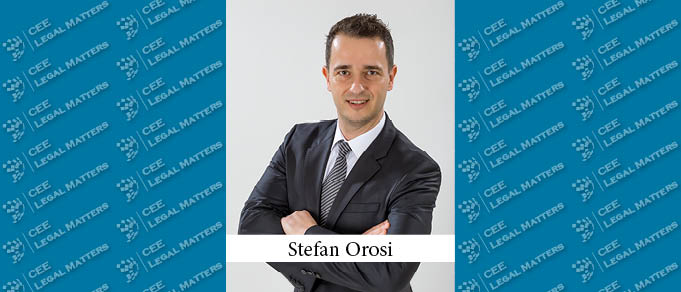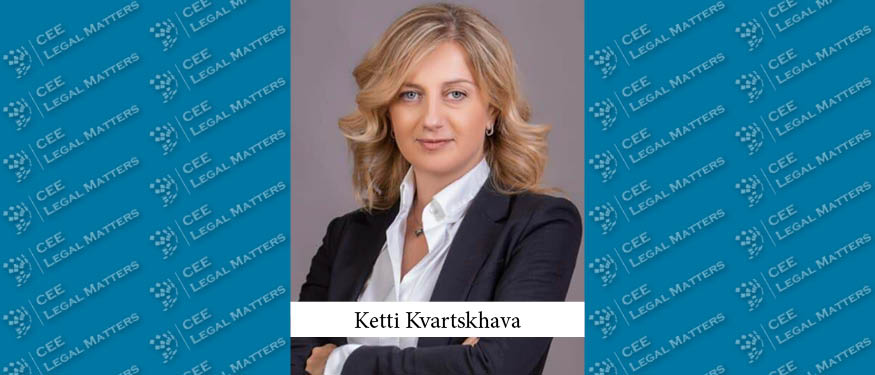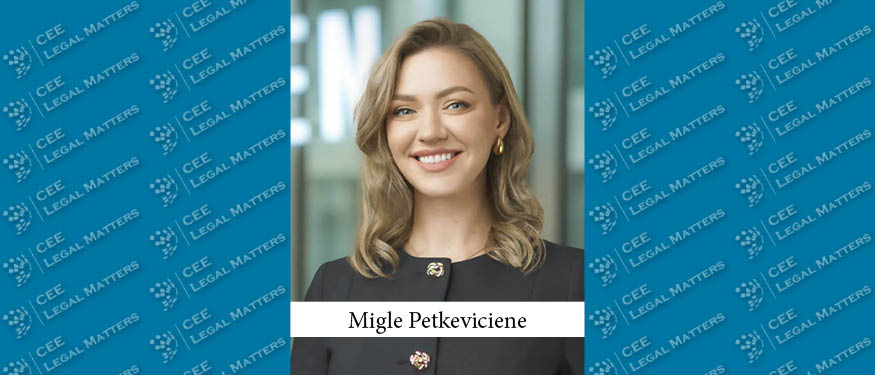“The in-house advisory role enables a lawyer to go deeper into the mysteries of the banking business and experience the life of a transaction, not just observe it from a distance. I elected to pursue an in-house practice at the beginning of my career, and even though I was tempted to switch to private practice many times, I remain loyal to the in-house life.”
CEELM: Can you walk us through your career leading you up to your current role?
Stefan: As far as I can recall, I have always seen myself as a clerk in a commercial bank. This perception has not changed during my legal studies either.
I graduated from law school at the P.J Safarik University in Kosice, in the eastern part of Slovakia, in the city where I was born. Shortly after finishing my studies, I took my first job as a Contract Legal Specialist for the Slovak Air Force Academy. That appointment lasted a year and two months, from October 2002 to November 2003. Although working for the military was exciting, I did not give up on my dream to work in a bank. In January 2004, I seized the opportunity to take a position as Investment Services In-House Legal Advisor Junior at HVB Bank Slovakia and moved to the capital of Slovakia.
At that time, HVB Bank Slovakia, a subsidiary of Austrian BA-CA and German Bayerische Hypo- und Vereinsbank, was a modern, flexible, dynamic commercial bank leading the then-developing market of financial transactions. I acquired most of my knowledge in Corporate Financing, Structured Financing, Real Estate Financing, Treasury Business (including investment services), Custody Services, and various types of business with securities, bank guarantees, and letters of credit. In addition to supporting the bank´s business, I played an advisory role in transforming the Slovak Central Securities Depository to meet international standards for the booking of securities held in custody by intermediaries. During this appointment, I assisted with the March, 2007 merger of the bank´s custody and treasury business into UniCredit Bank Slovakia (which was part of the consolidation of the whole banking business), and I remained at UniCredit as an in-house counsel for the next few months. My appointment with HVB Bank Slovakia – including succeeding UniCredit Bank Slovakia – lasted for almost four years, from December 2003 to September 2007. I was an active member of various working groups and commissions helping the market to implement MiFID.
In October, 2007, my experience providing investment services advice brought me to Slovenska Sporitelna, a major Slovak bank, where I was active as the in-house legal advisor on the project of setting up a trading infrastructure on the Austrian Erste bank group level. During my short appointment there, I chaired a working group for the revision of the corporate client financing documentation templates and actively advised the bank on transitioning from the Slovak national currency to the euro. Here I learned a lot about Corporate Financing.
In August 2008, I took a position as the Deputy General Counsel of Volskbank Slovensko, a small subsidiary of the Austrian bank, which was very active in financing small and medium sized clients. In April 2011, I was appointed General Counsel of the bank. I led a small but ambitious legal department, through its acquisition by Sberbank of Russia, until the end of 2012. These were very exciting times from an organizational and cultural point of view. I learned a lot about the management of internal legal services, the management of legal risks, internal legal affairs, regulatory issues, risk management, and work-outs.
In spring of 2013 I became General Counsel of a small local bank, Prima Banka Slovensko, which was owned by local private equity group PENTA. The Prima Banka brand had only recently appeared on the market. Prima Banka is a mid-sized commercial bank providing banking services to retail, municipality, and SME clients. For the first time, I added management of Anti-Money-Laundering and Fraud Prevention to my duties. As of March 2020, I have been in this position for seven years.
CEELM: You’ve never worked in private practice. Did you know, even in law school, you wanted to work in-house?
Stefan: Oh, yes. I always wanted to work in a bank. At the same time, I wanted to be a lawyer. Becoming an in-house counsel was the perfect combination of both my dreams. Practicing banking law in a law firm has, in comparison to in-house advisory, various benefits – but it has some limitations as well. The in-house advisory role enables a lawyer to go deeper into the mysteries of the banking business and experience the life of a transaction, not just observe it from a distance. I elected to pursue an in-house practice at the beginning of my career, and even though I was tempted to switch to private practice many times, I remain loyal to the in-house life.
CEELM: What are the most significant changes you’ve seen in Slovakian Banking law over your 17-18-year career?
Stefan: There have been a few – both positive and negative. Changes in the Banking laws always depend on the government of the country. Liberal governments have made a few very positive and constructive amendments to the laws. For example, the law of securing claims was completely redrafted, enabling creditors to effectively secure their claims for loan agreements. Various new public registers, especially those held by the Chamber of Notary Publics, were established. A brand-new Bankruptcy law, clearly based on the equality of claims of all creditors and prioritizing secured claims, was adopted. Close-out netting provisions have also been recognized by that law in Slovakia. Voluntary auction as an instrument was instituted, which enables secured creditors to foreclosure.
On the other hand, for the last couple years, lots of legislation aiming to protect consumers was adopted. Expressing my private opinion in general, no positive effect to consumers’ rights can be seen. Aside from mandatory provisions of EU consumer protection legislation (which have indisputably improved consumer protection), tremendously adverse effects on the clarity of general private law principles have resulted. This led to the inability of the courts to apply any reasonable legal explanatory rules or even to read the law at all. Emotional arguments of hurt consumers began to prevail in litigation. In addition, due to the inability of the courts to absorb robust consumer protection legislation, many new executive bodies have been established, usurping the judiciary of jurisdiction over disputes between banks and consumers.
CEELM: Are there changes you would like to see in the country’s Banking law that would make things easier for Prima Banka Slovensko?
Stefan: As a result of the coronavirus outbreak, there are many things that can be done to make life easier for both banks and their customers. The majority of them are macro-economic, and I do not feel competent to comment on them.
From a purely legal perspective, there is a wide range of measures the government could take to simplify banking business and services for the sake of all parties – including clients. One long-lasting problem of doing business in Slovakia is delays in court procedures. Although every government for the last couple of years has taken some measures, the problem as a whole has not been solved yet. Recently, an express procedure has been established for issuing judicial awards where there is no dispute between litigating parties – and this procedure truly works well.
There is a need to improve the substantive law as well. Much could be done in terms of predictability and simplicity. All Slovak legal practitioners are expecting a new Civil Code within the next few years, replacing the Socialist Civil Code of 1964, which will finally to come to an end.
All Slovak legal practitioners are expecting work on a new Civil Code, designed to supplement the Socialist Civil Code of 1964, finally to come to a successful end within the next few years.
If I were able to give one simple bit of advice to legislators, I would recommend that they apply common sense and set all new laws as simple to be understood as possible.
CEELM: Tell us about Prima Banka Slovensko, and about the company’s legal department. How big is your team, and how is it structured?
Stefan: Clients of Prima Banka are paramount to us. When the deal is done, they must be left with a sense of satisfaction. This applies to external as well as internal clients. This rule is very clear to my legal and compliance team and this is the basis for its establishment and functioning. My team is split into two functional and geographically distant parts. A total number of five lawyers provide legal advice to 23 head office departments, 8 regional business centers, and 121 branches. It is located in our head office in Bratislava. A compliance staff consisting of five people is located in Zilina, two hours away from the capital. I split my working hours evenly between both of them, so I travel a lot.
CEELM: What is your typical day at work like? How has that changed during the recent COVID-19 crisis?
Stefan: As my team is split into two locations, my days spent with lawyers differ from those I spend with the bank´s compliance staff. As a principle, we all work in open spaces as we believe information flow and prompt reactions are very valuable.
My life has not changed much during the coronavirus outbreak. There is still a lot of stuff that in-house lawyers have to handle, regardless of the external circumstances, although judicial proceedings have been postponed. Every single day I start by researching for new acts and measures of the government, public health services, and parliament. I also perform this same activity at the end of the day, before I leave my office. New laws and measures pop up so often that being vigilant in these days is more important than ever before.
CEELM: What do you consider your biggest single personal success or greatest achievement with Prima Banka Slovensko?
Stefan: My greatest achievement as an in-house counsel is the way I helped Prima Banka, in 2017, handle the acquisition of a competing Slovak midsize wholesale bank and its merger into Prima Banka. Despite the general perception that a merger of two banks must be a painful, difficult, long lasting, and expensive project, in Prima Banka we took a different approach. Leaving all external advisors outside and instead vesting trust in the abilities of the internal staff allowed that staff to feel fully involved – and this strategy paid off, contributing heavily to what we call the fastest and best banking merger in Slovakia yet. Since that final decision was made, through all regulatory approval processes, we reached commercial register confirmation of the merger within nine months. Another advantage of the full internal solution was maintaining coherence between individual agendas. Movements in product unification were compatible with movements in changes in IT solutions, legal developments, and technical movements. Everything fit together. I am proud that I could be part of the core team and contribute.
Additionally, in 2019, Prima Banka came to the market with its inaugural issue of covered bonds. It was both the first ever bond issue with a negative yield in Slovakia and the first ever covered bond issue with a negative yield in CEE. Again, I am proud to have been part of the core team.
CEELM: What one person would you identify as being most important in mentoring you in your career – and what in particular did you learn from that person?
Stefan: My biggest role model is Jan Rollo, the General Director of Prima Banka, who, with clearly-defined vision, made a big impact in my everyday activities as well as in much of my decision-making. His strict adherence to set goals proved a key strategy in providing the simplest and most easily-accessible products and services to clients, while still helping the bank develop and into the fastest-growing bank in Slovakia. It is very easy to understand why he was able to achieve this. Simplicity in products that are tailored for literally every category of clients are easier to develop – but at the same time clients are happier to pay a bit more them than they are for products and services that are very complicated to access.
CEELM: On the lighter side, what is your favorite book or movie about lawyers or lawyering?
Stefan: There is not much time left when I am off duty. On weekends I try to spend some time with my family outdoors. John Grisham's books are probably my most favorite, especially the older ones. The Runaway Jury and The Firm fascinated me the most.
This Article was originally published in Issue 7.5 of the CEE Legal Matters Magazine. If you would like to receive a hard copy of the magazine, you can subscribe here.













